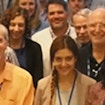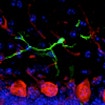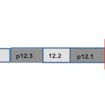
SFARI held its sixth annual meeting, bringing together some 150 SFARI-supported autism researchers in an effort to advance the understanding of autism, improve its diagnosis and better the experience of those on the autism spectrum.

SFARI held its sixth annual meeting, bringing together some 150 SFARI-supported autism researchers in an effort to advance the understanding of autism, improve its diagnosis and better the experience of those on the autism spectrum.

On 12 and 13 June, the Simons Foundation Autism Research Initiative (SFARI) held its second workshop on 16p11.2 deletion and duplication. A total of 62 participants from across the U.S. and Europe attended the meeting.

For individuals with autism, a trip to the clinic — an unfamiliar place with strange people and instruments — can be exceedingly stressful. And as many genetic databases for autism include tens of thousands of participants, it is increasingly challenging for researchers to do in-person assessments for each individual. On 14 February, SFARI hosted a workshop to explore the benefits and pitfalls of using online tools to help collect data from individuals with autism.

Glia were once thought to play a secondary role to neurons in the brain. But studies in the past few years have shown that they may be involved in many brain disorders, including autism. On 7 December, SFARI and the Rett Syndrome Research Trust organized a meeting of scientists working on the intersection of glia with autism and Rett syndrome.

Converging lines of evidence suggest that the earliest events in brain development play a role in autism. On 12 September, the Simons Foundation Autism Research Initiative brought together a group of scientists to discuss the latest findings on early brain development’s relevance to autism, based on studies ranging from structural imaging in children to analysis of postmortem brains and mouse models.

The chromosomal region 16p11.2, which spans about 29 genes, is strongly linked to autism. On 27 April, SFARI hosted a workshop to discuss the consequences of duplications or deletions of this region.

Studies suggest that a subset of children with autism make significant social and language gains in the first year of life, and then experience a dramatic loss of skills, termed regression. On 13 February, SFARI hosted a workshop to explore whether children with regression are a unique subgroup, and concluded that most children with autism show a gradual decline in skills rather than an abrupt loss of abilities.

Researchers can use biomarkers to diagnose individuals with autism and to hone in on the underlying causes of the disorder. In July, SFARI held an informal meeting of minds at Stony Brook University to discuss biomarkers for autism.